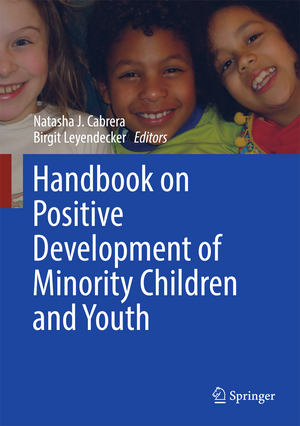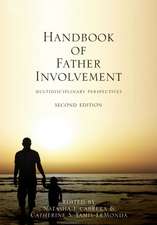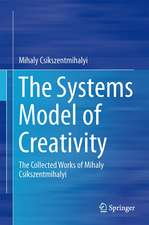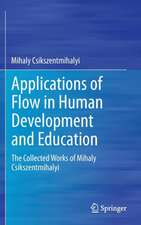Handbook on Positive Development of Minority Children and Youth
Editat de Natasha J. Cabrera, Birgit Leyendeckeren Limba Engleză Hardback – 14 feb 2017
| Toate formatele și edițiile | Preț | Express |
|---|---|---|
| Paperback (1) | 1314.17 lei 38-44 zile | |
| Springer International Publishing – 9 iun 2018 | 1314.17 lei 38-44 zile | |
| Hardback (1) | 1501.78 lei 38-44 zile | |
| Springer International Publishing – 14 feb 2017 | 1501.78 lei 38-44 zile |
Preț: 1501.78 lei
Preț vechi: 1976.04 lei
-24% Nou
Puncte Express: 2253
Preț estimativ în valută:
287.37€ • 300.79$ • 239.18£
287.37€ • 300.79$ • 239.18£
Carte tipărită la comandă
Livrare economică 26 martie-01 aprilie
Preluare comenzi: 021 569.72.76
Specificații
ISBN-13: 9783319436432
ISBN-10: 3319436430
Pagini: 1043
Ilustrații: XXXIV, 489 p. 14 illus.
Dimensiuni: 178 x 254 x 34 mm
Greutate: 1.47 kg
Ediția:1st ed. 2017
Editura: Springer International Publishing
Colecția Springer
Locul publicării:Cham, Switzerland
ISBN-10: 3319436430
Pagini: 1043
Ilustrații: XXXIV, 489 p. 14 illus.
Dimensiuni: 178 x 254 x 34 mm
Greutate: 1.47 kg
Ediția:1st ed. 2017
Editura: Springer International Publishing
Colecția Springer
Locul publicării:Cham, Switzerland
Cuprins
Introduction to the Handbook; Natasha J. Cabrera and Birgit Leyendecker.- Section I. Conceptual and Methodological Approaches.- Introduction: Conceptual and Methodological Approaches; Frosso Motti-Stefanidi, Section Editor.- 1. Positive Youth Development among Minority Youth: A Relational Developmental Systems Model; Richard M. Lerner, Jun Wang, Rachel M. Hershberg, Mary H. Buckingham, Elise M. Harris, Jonathan Tirrell, Edmond P. Bowers and Jacqueline V. Lerner.- 2. A Resilience Perspective on Immigrant Youth Adaptation and Development; Frosso Motti-Stefanidi and Ann Masten. - 3. Measuring Positive Development I: Multilevel Analysis; Jens B. Asendorpf.- 4. Equivalence in Research on Positive Development of Minority Children: Methodological Approaches; Fons J. R. van de Vijver and Jia He.- Section II. Individual Level Influences.- Introduction: The Puzzle of Coaction and The Imbroglio of Paradox; Robert H. Bradley, Section Editor.- 5. Parental Sensitivity and Attachment in Ethnic Minority Families; Maike Malda and Judi Mesman.- 6. Conceptualizing Variability in U.S. Latino Children’s Dual-Language Development; Kelly Escobar and Catherine S. TamisLeMonda.- 7. An International Perspective on Parenting and Children's Adjustment; Jennifer E. Lansford.- 8. Cultural Identity Development as a Developmental Resource; Paul Vedder and Mitch van Geel.- 9. Differential Susceptibility in Minority Children: Individual Differences in Environmental Sensitivity; Elham Assary and Michael Pluess.- Section III. Family/Parenting Level Influences.- Introduction: Parenting and Language in Ethnic Minority and Immigrant Families in North America and the European Union: Toward an Emphasis on Positive Development; Marc H. Bornstein, Section Editor.- 10. Parenting and families in the United States and Canada; Catherine Costigan, Joelle Taknint, and Sheena Miao.- 11. Family Resources for Promoting Positive Development among Minority Children: European Perspectives; Sabine Walper and Birgit Leyendecker.- 12. Minority Fathers and Children’s Positive Development in the United States; Natasha Cabrera, Elizabeth Karberg, and Catherine Kuhns.- 13. Language and Parenting: Minority Languages in North America; Allyssa McCabe.- 14. Minority Language Parenting in Europe and Children's Well-Being; Annick De Houwer.- Section IV. Peers and Friendship Level Influences.- Introduction: The Contribution of Friendship and Peers to Immigrant Youth’ Positive Development; Christiane Spiel, Section Editor.- 15. Interethnic Friendship Formation; Peter F. Titzmann.- 16. The Friendships of Racial-Ethnic Minority Youth In Context; Leoandra Onnie Rogers, Erika Y. Niwa, and Niobe Way.- 17. Minority and Majority Children’s Evaluations of Social Exclusion in Intergroup Contexts; Aline Hitti, Kelly Lynn Mulvey, and Melanie Killen.- 18. Children’s Healthy Social-Emotional Development in Contexts of Peer Exclusion; Tina Malti, Antonio Zuffianò, Lixian Cui, Tyler Colasante, Joanna Peplak, and Na Young Bae.- 19. Positive Development of Minority Children; Radosveta Dimitrova and Laura Ferrer-Wreder.- Section V. Early Childhood Education and Schools.- Introduction: The Positive Development of Minority Children At Home and In School; Allan Wigfield.- 20. Promoting Positive Self-Esteem in Ethnic Minority Students: The Role of School and Classroom Context; Jochem Thijs and Maykel Verkuyten.- 21. Parental Educational Involvement and Latino Children’s Academic Attainment ; Rosario Ceballo, Rosanne M. Jocson and Francheska Alers-Rojas.- 22. Using Self-Regulated Learning as a Framework for Creating Inclusive Classrooms for Ethnically and Linguistically Diverse Learners in Canada; Nancy Perry, NikkiYee, Silvia Mazabel-Ortega, Simon Lisaingo and Elina Määttää.- Section VI. Policies/Prevention/Programs.- Introduction: Positive Development of Minority Children and Youth: Translating Theory to Action; Nancy Gonzalez, Section Editor.- 23. Documentation Status and Child Development in the U.S. and Europe; Natalia Rojas and Hirokazu Yoshikawa.- 24. Research on Positive Youth Development in Boys of Color: Implications for Intervention and Policy; Noni Gaylord-Harden, Cynthia Pierre, Latrice Clak, Pat Tolan, and Oscar Barbarin.- 25. Civic Engagement as an Adaptive Coping Response to Conditions of Inequality: An Application of Phenomenological Variant of Ecological Systems Theory (PVEST); Elan C. Hope and Margaret Beale Spencer.- 26. Developing an Ethnic-Racial Identity Intervention from a Developmental Perspective: Process, Content, and Implementation of the Identity Project; Adriana J. Umaña-Taylor and Sara Douglass.- 27. Children’s Centres: an English Intervention for Families Living in Disadvantaged Communities; Maria Evangelou, Jenny Goff, Kathy Sylva, Pam Sammons, Teresa Smith, James Hall and Naomi Eisenstadt.- 28. Instructional Practice with Young Bilingual Learners: A Canadian Profile; Roma Chumak-Horbatsch.
Notă biografică
Natasha J. Cabrera, Ph.D, is Professor of Human Development at the University of Maryland and was a Society for Research in Child Development, Executive Branch Fellow at the National Institute of Child Health and Human Development (NICHD). Dr. Cabrera's research, funded by NICHD, focuses on father involvement and children's social development; adaptive and maladaptive factors related to parenting; ethnic and cultural variations in fathering and mothering behaviors; family processes in a social and cultural context and children's development; and the mechanisms that link early experiences to children's school readiness. Cabrera has published in peer-reviewed journals on policy, methodology, theory and the implications of fathering and mothering behaviors on child development in low-income minority families. She is the co-editor of the Handbook of Father Involvement: Multidisciplinary Perspectives, Second Edition (Taylor & Francis, 2013) and Latina/o Child Psychology and MentalHealth: Vol 1: Early to Middle Childhood: Development and Context and Vol 2: Adolescent Development (Praeger, 2011). Dr. Cabrera is the Associate Editor of ECRQ and Child Development and the recipient of the National Council and Family Relations award for Best Research Article regarding men in families in 2009. In 2015 The National Academy of Sciences appointed her to its committee supporting the parents of young children and she is a 2015-2016 Visiting Scholar at the Russell Sage Foundation
Textul de pe ultima copertă
This Handbook presents current research on children and youth in ethnic minority families. It reflects the development currently taking place in the field of social sciences research to highlight the positive adaptation of minority children and youth. It offers a succinct synthesis of where the field is and where it needs to go. It brings together an international group of leading researchers, and, in view of globalization and increased migration and immigration, it addresses what aspects of children and youth growing in ethnic minority families are universal across contexts and what aspects are more context-specific. The Handbook examines the individual, family, peers, and neighborhood/policy factors that protect children and promote positive adaptation. It examines the factors that support children’s social integration, psychosocial adaptation, and external functioning. Finally, it looks at the mechanisms that explain why social adaptation occurs
Caracteristici
Represents new directions in research on minority children away from risks, towards positive development Provides a platform for increased and much-needed research on minority children in Europe Is organized in line with the ecological perspective that the child is nested in a complex network of interconnected systems Includes supplementary material: sn.pub/extras











